3 Review of Unit 7-12
七年级英语Review of Unit3
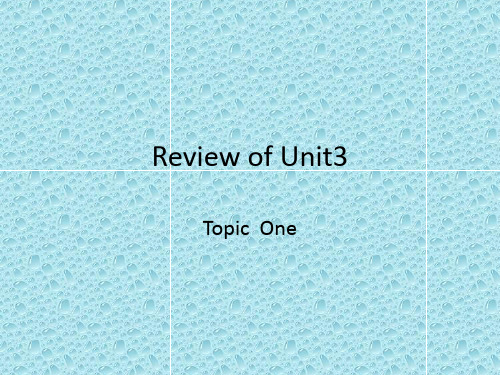
Topic 2
1.你爸爸是做什么的? 他是一个厨师。 2.你爸妈做什么? 他们是办公室工作人员。 3. 他在哪里上班?他在一家医院上班。 4.他们在一个农场工作。 5.见到你真高兴。 6.我到家了。 7.Maria让康康看一张她的全家福。 8. 能让我看一下这支笔吗? 9.她喜欢和Kitty一起玩。 10.它的颜色是黑白相间。 11.穿黄色衣服的年轻女子是谁?
1.What does your father do?/What is your father? He is a cook. 2.What do your parents do? They are office workers. 3.Where does he work? He works in a hospital. 4. They work on a farm. 5.Glad to meet/see you. 6.I’m home. 7.Maria shows a photo of her family to kangkang. Maria shows kangkang a photo of her family. 8.Can you show me the pen? Could you please show the pen to me? 9.She likes to play with Kitty. 10.Its color is black and white. 11.Who is the young woman in yellow?
1. What does Lucy usually have for breakfast? She usually has milk and bread for breakfast? 2. May I take your order, sir? Fish with vegetables and rice,please. 3. Would you like something to drink? Yes . A glass of apple juice,please./No,thanks. 4.What would you like to eat? Let me see./ I’d like some chicken. 5.Why not have some fish and eggs? Good idea. 6.Help yourselves to some fish. 7.May I help you? 8.Here you are. 9. They are all kind/friendly to me. 10.I’m very glad to be here. 11. What /How about that skirt? 12.What /How about having a picnic this Sunday? 13.I look forward to your visit next Sunday.
Review of Unit3
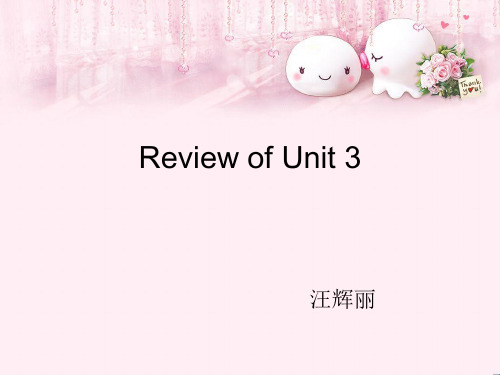
I hate …
Functions (P73)
表达同意和不同意。
Agreement
I agree _______ with you.
Disagreement
I don’t ________ agree .
so Yes, I think _______ . No. I don’t think ______ so. right . You are quite ______
Grammar
(P57)
• used to do sth.过去常常做某事 • 1.I used to collect stamps. • 2.He used to play basketball. 否定句: 一般疑问句及回答:
特殊疑问句:
Grammar
• 感ቤተ መጻሕፍቲ ባይዱ句
(P63)
• 选词填空 • 1.What(What/How) bad weather! • 2.How beautiful (beautiful/a beautiful) the music sounds!
Review of Unit 3
汪辉丽
What's your hobby?
Our Hobbies
What sweet music!
What were you doing at this time yesterday?
学习目标
• • • • 1.复习used to 的用法。 2.复习感叹句的表达。 3.复习过去进行时。 4.复习如何谈论兴趣爱好,表达喜欢不喜欢, 和表达同意不同意的用法。
Grammar
• 过去进行时
(P71)
• Jane was reading English at this time yesterday. • 否定句:
初中英语七年级下册unit3Review of Unit 3

(1)take/ride/drive+限定词+交通工具类名词 交通工具名词前加冠词、指示代词、形容词 性物主代词或名词所有格。 翻译:琳达每天乘火车去上学。 Linda takes the train to school every day.
seventyeightyninetyhundredminutefar
n. 千米;公里adj. 新的;刚出现的adj. 每一;每个prep.(表示方式)乘(交通工具)v. 开车n. 小汽车;轿车
kilometerneweverybydrivecar
v. 居住;生活n. 车站;停止v. 横过;越过n. 河;江adj. & pron. 许多n. 村庄;村镇
4. —______ is it from the train station to your grandparents’house? —About 18 kilometers. A. How much B. How long C. How far D. How many
一、根据句意及汉语提示填写单词。
car
seventy
live
drive
5. The ________ (村民) are working on the farm.6. There is a small ________ (桥) on the river.7. It’s not easy to ________ (离开) the village. 8. Are you _______ (害怕) of taking a plane?9. Lucy has a great _________ (梦想).
图 3
图 4
train station
subway station
新视野大学英语视听说教程2第三版BOOK3 UNIT7

What I am not so good at is interpersonal relationships. Sometimes I find it difficult to communicate with people. And to be frank, I am afraid of talking to people, especially strange people.
Opening up
1 Match the solutions in the box to the problems listed below.
renewable energy
nuclear power
energy policy
Opening up
1 Match the solutions in the box to the problems listed below.
Wrapping up Fun time
Learning objectives
1 talk about solutions to problems 2 listen for specific information 3 request and respond properly 4 present an invention 5 make an introduction speechntion to: • What is his / her educational background? • What does he / she do? • What achievements has he / she made? …
初中英语(7-9年级)常用版本教材(分年级分册)目录—仁爱版
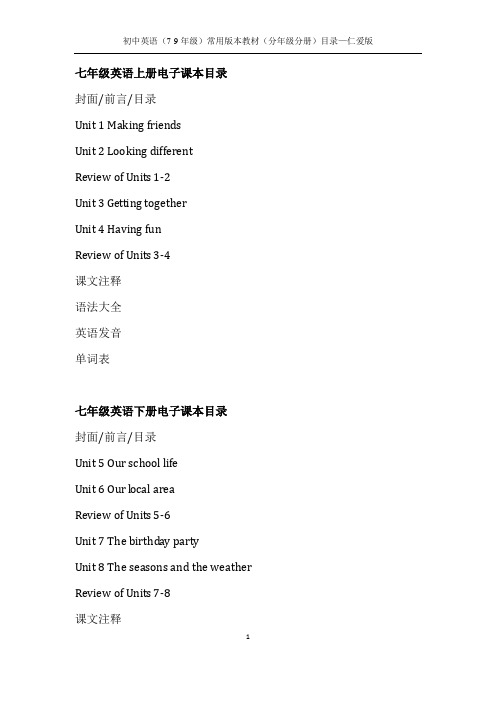
七年级英语上册电子课本目录封面/前言/目录Unit 1 Making friendsUnit 2 Looking differentReview of Units 1-2Unit 3 Getting togetherUnit 4 Having funReview of Units 3-4课文注释语法大全英语发音单词表七年级英语下册电子课本目录封面/前言/目录Unit 5 Our school lifeUnit 6 Our l ocal areaReview of Units 5-6Unit 7 The birthday partyUnit 8 The seasons and the weather Review of Units 7-8课文注释语法大全单词表八年级英语上册电子课本目录封面/前言/目录Unit 1 Playing sportsUnit 2 Keeping healthy Review of Units 1-2Unit 3 Our hobbiesUnit 4 Our worldReview of Units 3-4课文注释语法大全单词表八年级英语下册电子课本目录封面/前言/目录Unit 5 Feeling excitedUnit 6 Enjoying cycling Review of Units 5-6Unit 7 Food festivalUnit 8 Our clothesReview of Units 7-8课文注释语法大全单词表九年级英语上册电子课本目录封面/前言/目录Unit 1 The Changing WorldUnit 2 Saving the EarthReview of Units 1-2Unit 3 English Around the WorldUnit 4 Amazing ScienceReview of Units 3-4课文注释语法大全单词表九年级英语下册电子课本目录Unit 5 China and the worldTopic 1:China attracts millions of tourists from all over the Word.Topic 2:He is really the pride of China.Topic 3:Now it is a symbol of England.Review of Unit 5Unit 6 Entertainment and FriendshipTopic 1:I woul d rather watch sports shows than those ones.Topic 2:Who is your favorite character in literature?Topic 3:I will remember our friendship foreverReview of Units 5-6课文注释语法大全单词表常用短语和习惯搭配。
Review of Units 7 -8

3.QUIETLY A man is walking quietly.
4.HARD She is working hard at the desk 5.SLOWLY An old man is walking slowly 6.FAST He is running fast. 7.DANGEROUSLY He is driving dangerously.
Task 3 Complete the sentences with the
1.
words in the box,using so….that,such..that or so that
so short that 2. so tired that 3. so slowly that 4. such, expensive, that 5.carefully so that 6.hard so that
Task 4. Make sentences after the example,using the questions in the box.
1.Maria asked the saleswoman if/whether she had anything cheaper. 2.Maria asked the saleswoman if/whether she might try it on. 3.Maria asked the saleswoman if/whether she could have a look at the blue one. 4.Maria asked the saleswoman what sizes she had. 5.Maria asked the saleswoman how much it was.
人教版初中英语人名大全

Review 7-12 Unit 1 Unit 3
Unit 5
八上
Unit 6 review 1-6
Unit 8
Unit 9
Unit 10 Unit 11
Unit 12
review 7-12 Unit 1
Unit 2
Annie 安妮(女) Carol 卡萝尔(女) Brad 布拉德(男) Kevin 凯文(男) Taylor 泰勒(姓) Rice 赖斯(姓) Alex 亚历克斯(男) Emily 埃米莉(女) Vickers 维克斯(男)
Unit 14 Unit 15
Crystal
克里斯特尔,克丽丝特尔 (女或姓)
Elise 埃莉斯(女)
Mariah 玛丽亚(女)
Carey 凯里(姓)
Winterbourne 温特伯恩(姓)
Ed 埃德(男) Hall 霍尔(姓) Bill 比尔(男) Sandra 桑德拉(女) Clark 克拉克(姓) Joe 乔(男) Lisa 莉萨(女)
Unit 8
Unit 9
Unit 10
Unit 11 Unit 12 Review 7-12
Unit 1
Unit 2 Unit 3
七下
Unit 4
人教版人名大全
年级
单元
Starter Unit 1
Unit 1
Unit 2
Unit 3
七上
Unit 4 Unit 5
Unit 6
Review 1-6 Unit 7
英文
中文
Alice 艾丽斯(女) Bob 鲍勃(男)
Cindy 辛迪(女) Dale 戴尔(男) Eric 埃里克(男) Frank 弗兰克(男) Grace 格雷丝(女) Helen 海伦(女) Jenny 珍妮(女) Gina 吉娜(女) Alan 艾伦(男) Mary 玛丽(女) Jim 吉姆(男) Tony 托尼(男) Tom 汤姆(男) Bob 鲍勃(男) Mike 迈克(男) Green 格林(姓) Miller 米勒(姓) Jack 杰克(男) Smith 史密斯(姓) Brown 布朗(姓) Linda 琳达(女) Nick 尼克(男) Kim 金(女) Hand 汉德(姓) Tim 蒂姆(男) Sonia 索尼娅(女) Jane 简(女) Kelsey 凯尔茜(女) David 戴维(男) Dave 戴夫(男) Anna 安娜(女) Paul 保罗(男) Emma 埃玛(女) Mona 莫娜(女) Tommy 汤米(男) Sally 萨莉(女) Peter 彼得(男) Barry 巴里(男)
初中英语九年级英语上册Review of Unit 3
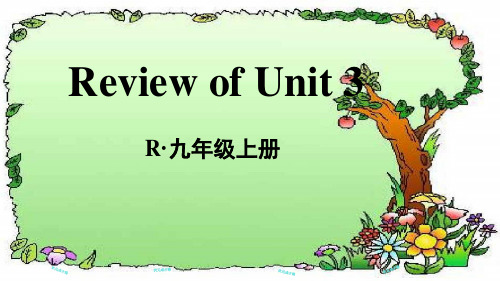
状元成才路
adj. 便利的;方便的 n. 拐角;角落 adv. 礼貌地;客气地 n. & v. 要求;请求 n. 方向;方位 adj. 正确的;恰当的 adj. 有礼貌的;客气的
direct speaker
whom impolite address underground
—It can’t be Mr. Smith. He is ______ the way to
London now.
A. on
B. by
C. at
D. with
状元成才路
2. —Are you ______ a supermarket on your
way home?
—Yes. Walmart is just beside my home.
状元成才路
(2)语序的变化 在含有宾语从句的复合句中,宾语从句要用
陈述语序。因此当特殊疑问句作宾语从句时,一 定要注意语序。例如:
“Where did he go last month?” She asked. She asked where he went last month.
状元成才路
[注意]当疑问代词what/ who在特殊疑问句中 作主语时,该特殊疑问句本身就是陈述语序,所 以转变成宾语从句后无需再调整语序。例如:
17. 与……交流
communicate with...
18如
such as/ for example
20. 期盼
look forward to
21. 停车场;停车区 parking lot
状元成才路
巩固训练
pass 相关短语 传递
Review of Unit 3
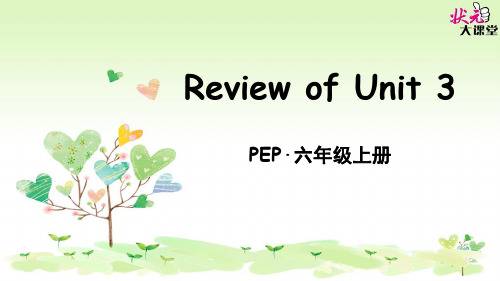
Tom: Where are you going this afternoon? John: 1.___C_____
going going there going to do going to buy
tomorrow tonight
next week this afternoon
this evening
例:What are you going to do tonight?
1. When is she going? 2. What are you going to do tomorrow? 3. What are they going to buy next week? 4. Where are you going tonight?
supermarket
Task 2 Sentences
询问对方打算做什么的句型及答语
问句 What are you going to do+其他?
I'm/We're going to +动词原 形+其他.
答语
询问对方打算去哪里的句型及答语
问句
Where are you going?
I'm/We're going (to) +地点. 答语
1.时间:_A__B__D__ 2.活动:_E__G__I_J_ 3.纸质书类:__C_F__H__
仁爱版初中初一英语下册《Review of Unit…》评课稿

仁爱版初中初一英语下册《Review of Unit…》评课稿一、引言《Review of Unit…》是仁爱版初中初一英语下册中的一篇重要课文。
本评课稿旨在对这篇课文进行评析,探讨教学内容和教学方法的优劣,为教师在教学过程中提供参考和借鉴。
二、课文内容概述《Review of Unit…》是一篇英语课文,旨在复习该单元的重点知识和语法。
课文内容主要包括以下几个方面:1.重点单词:列举并复习本单元的关键词汇,包括动物、食物、颜色、数字等。
2.重点句型:介绍并复习本单元所学的重点句型,如表示喜好、询问和回答数量的句型等。
3.语法练习:通过问答、填词等形式巩固本单元所学的语法知识,包括动词的过去式、形容词的比较级等。
三、教学目标基于对课文内容的概述,我们可以确定以下教学目标:1.熟练掌握本单元的重点词汇,并能正确运用到适当的语境中。
2.掌握本单元所学的重点句型,能够灵活运用于日常交际中。
3.巩固并加深学生对本单元所学的语法知识的理解,并能够正确运用。
四、教学重点和难点1.教学重点:重点词汇的掌握和运用、重点句型的理解和运用、语法知识的巩固和应用。
2.教学难点:确保学生能够准确地理解和运用重点句型,并能够正确应用所学的语法知识。
五、教学方法为了达到教学目标,本课程将使用以下教学方法:1.集体讨论:教师引导学生进行集体讨论,帮助学生理解词汇、句型和语法知识的意义和用法。
2.小组活动:将学生分为小组,进行词汇梳理和句型运用的小组活动,培养学生的合作意识和语言表达能力。
3.情境模拟:通过情境模拟,让学生在实际的交流中运用所学的知识,提升其语言运用的能力。
六、教学过程本节课的教学过程分为以下几个步骤:1.引入新课:通过图片、课件等教具,引入本节课的内容,并激发学生学习的兴趣和积极性。
2.复习词汇:对本单元的重点词汇进行复习,可以使用卡片、抽签等方式,让学生积极参与。
3.复习句型:通过示例句和练习题,复习本单元所学的重点句型,加深学生对句型的理解和运用。
七年级英语必背句子

Review of Units 1-6Unit 11.你叫什么名字?我叫大宝.2.他叫什么名字?他叫小金.3.她叫什么名字?她叫小林。
4.见到你很高兴。
5.他的姓是什么?他是姓是李。
6.她的名是什么?她的名是小梅。
7.你的电话号码是多少?我的电话号码是。
8.他的电话号码是。
9.她的电话号码是多少?10.她的号码是。
11.你的老师的电话号码是多少?我的老师的电话号码是。
Unit 21.这是一把尺子。
那是一根铅笔。
2.这是什么?是只钢笔。
3.那是什么?是块橡皮。
4.这些是什么?这些是文具盒。
5.那些是什么?那些是卷笔刀。
6.这是你的字典吗?是的。
7.那是他的书吗? 不是的。
是她的书。
8.这些是他的笔记本吗?是的。
9.那些是Gina的字典吗?不是的,他们是Jim的。
10.这个用英语怎么说?是字典。
11.那个用英语怎么说?是篮球。
12.你怎么拼“橡皮”?E-R-A-S-E-R.13.你的手表在失物招领处。
14.失物招领处的那个背包是你的吗?15.给Alan打82241818这个电话。
16.请给我打电话。
Unit 31.这是我爸爸,那是我妈妈。
2.这些是我的兄弟,那些是她的姐妹。
3.他们是我的堂兄妹。
4.这是他的叔叔。
那是她的阿姨。
5.这些是Lily的爷爷奶奶。
6.这个是他的爷爷,那个是他的奶奶。
7.那些是Sonia的父母亲。
8.Tom是Mrs Brown的儿子。
9.Gina是Mrs Brown的女儿。
10.那是他的儿子吗?是的。
11.这是她的女儿吗?不是的,她是她姐姐的女儿。
12.Mr Smith有两个儿子,三个女儿。
13.这是你的朋友吗?是的。
14.那是你的表姐吗?不是的,她是我姐姐。
15.他是你的叔叔吗?是的。
16.她是你的阿姨吗?不是的,她是我妈妈。
17.这些女孩子是她的朋友。
那些男孩子是他的朋友。
18.感谢某人为某事19.我的家庭照片20.他的家庭照片21.我们班的照片22.谢谢你的家庭照片。
23.谢谢你的字典。
英语高一必修一Review of Unit 3
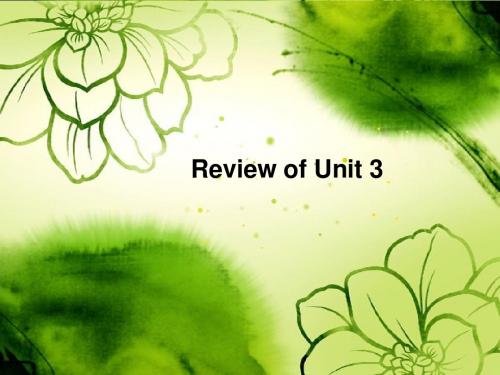
B
C
骑自行车 细节,详情 来源,水源 海拔高度 保险 枕头,枕垫 步调,速度 沸腾,水开 预测,预报 小包,包裹
Phrases
自从,自....以后 喜爱,喜欢 关心,忧虑,惦念
A
宁愿做A也不愿做B 按时刻表,按时间表 与A相比更喜欢B 利用 喜欢,关心,照顾 决心做某事(表状态)
B
C
改变主意
下决心,决定 投降,屈服,让步 照常 在午夜
说服某人做某事
毕业于....(学校) 为某事安排时间 梦想做某事 迫不及待做某事
Байду номын сангаас失去理智
泄露,赠送,免费给 予 分发,分配 立刻,马上
对.....的态度,看法
Grammar tips
• 1. ever since 的用法
•
ever since 引导短语或句子做时间状语时,句子
或主句部分用现在完成时,从句用过去式
n+easy/difficult/hard/beautiful/nice/interesting/da ngerous + to do
• 1. She ___(说服) her huaband to give up his drinking habit. • 2. He has decided to overcome all his __(缺点). • 3. There are ___(有决心的) people who swim there every day. • 4. Let me go shares with you in the taxi f___. • 5. According to the___(进度表) we should have completed half of our work by this month. • 6. Few people clearly expressed their ___(态度) towards this proposal at the meeting. • 7. His brother is a very r___young man, so I'm sure you can depend on him. • 8. 她坚持要求我们给小狗洗澡。 • She insists that _____________.
新目标八年级英语下册Unit 7教学设计

新目标八年级英语下册Unit 7教学设计nit7 Would you mind turning down the music?Section A?a銆?b銆?c紝鍧囧洿缁?a幇Would you mind +銆傚啀鍛堢幇Would you mind not+?a鐨勫?a銆?b鎴愩€?a2b?a ould you mind 鈥?鍜學ould you mind not鈥?2b?c瑕佹眰浠?a銆?b熻兘椤圭洰銆傚湪3a3b ould you, Could you, have to?閮ㄥ垎鐨刧roupwork?Section B?a銆?a銆?b 閮藉洿缁曠殑鍗¢€氱敾灞曞紑锛?c鏄?a銆?b紝3a鍜?b3a銆?b鐨勪换鍔★紝鍔犳繁瀛︾敓瀵光€В鍜岃繍鐢ㄣ€係elf check屼絾绗?2ф,鍗抽€氳繃瀵绘壘涓鏂囧寲鑳屾櫙涓嬬殑绀间华锛?紝浠ュ強濡備綍鍋氬嚭鍚堥€鐨勫彞鍨嬧€濓紝鎴戝皢SectionB1a-2c鍜孲ectionA3a-4鏁村悎鍦ㄤ竴璧蜂綔涓ectionB1a-2cН鏋佹€э紝ectionA3a-4鈥濈殑鐞嗚Вч?т笂鍐孶nit 11an you鈥?/could you 鍙奀ould you please鎻愬嚭璇锋眰,х殑锛屽唴瀹硅创杩戠敓娲伙紝瀛︾敓姣旇緝瀹规槗杩涘叆瑙掕壊銆?鐨勮嚜涓汇€佸悎浣溿€佹帰绌躲€佸疄璺电殑鑳藉姏銆傚洜姝ゅ湪鑰冭檻鏈鈥滃揩涔濯掍綋璇句欢灞曠ず锛屽苟閰嶄互涓板瘜鐨勫浘鐗囧強鑹插僵锛屼负瀛︾敓鐨箰鎴愰暱銆?鈶?Be able to pronounce and master the new words and phrases.Words: mind, yard, dish, polite, perhaps, door, line, return, voice, term, Asian, Europe, impolite, allow, public, cough, break, smoke, drop, litter, cigarette, criticize, behave锛宔tc.Phrases: turn down, not at all, right away, wait in line, cut in line, keep down, at first, put out, pick up.鈶?Master the target language:Would you mind moving your bike? Sorry, I will do it right away.Would you mind not playing baseball here? Sorry, we鈥檒l go and play in the park.Could you please wash the dishes? Ok, I will do them in a minute.鈶?Learn to make requests and apologies, using the target language.鈶?Learn the modal verb that can express request.1.Would you mind 鈥?鍜孋ould you please 鈥? 浠ュ強Sorry, I鈥檒l 鈥?绛夊彞鍨嬬殑鐞嗚В?2.Would you mind 鈥?鍜孋ould you please 鈥?鏃讹ould you mind +鍔ㄥ悕璇嶏紝鑰孋ould you please +鍔ㄨ瘝鍘熷舰銆ot锛宯ot鎵€鏀剧殑浣嶇疆锛屽Would you mind not鈥? Could you please not 鈥?锛岃繖浜涘唴瀹圭殑鎺屾彙鍜岃繍鐢ㄦ槸瀛︾敓瀛︿範鐨勯毦鐐广€?"??棣栧?硅瘽绛夌幆鑺備腑銆??璇炬椂瀹夋帓鏁欐硶閫夋嫨SectionA1a-Grammar Focus(備綍鍋氬嚭鍚堥€傜殑鍥炵瓟銆?SectionB1a-2c, SectionA3a-4(?SectionB3a- Selfcheck(濈殑鐞嗚В鍜岃繍鐢? ReadingReview of Unit7(ч)璇炬椂Period1у??,閫氳繃鍚戜粬浜烘彁绀艰矊璇锋眰浠ュ強鍋氬嚭鍥炵瓟,鏉ョ粌涔爓ould you mind (not)doing 杩欎竴璇,ц儐姝g‘鐨勫彛澶翠氦闄呭拰姝g‘鐞嗚В?istening method, speaking method, cooperating method, inductive method殑瀛︿範銆?浠诲姟鏁欏笀娲诲姩瀛︾敓娲诲姩?Step 1 warming upLet鈥檚say the chart 鈥淣o, not at all鈥? Teacher says and have Ss do. Say and do the chart :鈥淣o, not at all鈥?鈥淪tand up, stand up, would you mind standing up?Sit down, sit down, would you mind sitting down?Clap your hands,clap your hands,Would you mind clapping your hands?Touch your nose, touch your nose,Would you mind touching your nose?鈥?鈥淣o, not at all鈥?Step 2 lead in1. Say, I think it is a little bit hot in our classroom and I want to ask someone to open the window. What can I say?Have Ss give some answers.2. Write them on the board: Could you please鈥? 鈥? Would you mind opening the window? Explain that the last example is a very polite way of making a request.Answer the teacher鈥檚questions.Understand the new sentences: 鈥淐ould you please鈥? 鈥? Would you mind opening the window?鈥?Step 3 Presentation1. Have Ss look at the picture and ask a pair of students to read the dialogue in the picture.2. Then show some other pictures. Have Ss look and say them using 鈥渨ould you mind 鈥?鈥漧ike above.3. Look at the picture and ask a pair of students to read the dialogue in the picture.4. Then show some other pictures. Have Ss look and say them using 鈥渨ould you mind not 鈥?鈥?like above.1. Look at the picture and read the dialogue in the picture.2. Look at some other pictures and say them using 鈥渨ould you mind 鈥?鈥漧ike above.3. Look at the picture and read the dialogue in the picture.A: Would you mind not smoking?4. Look at some other pictures and say them using 鈥渨ould you mind not 鈥?鈥?like above.Step 41a1. Point to the four requests in the box. Read each phrase to the class and get students to repeat it. Ask students to explain what each one means. They can use actions and simple explanations.2. Then get students to write the letter of each request in the correct place in the picture to match the requests with the people. Point out the blank boxes in the picture. Ask students to finish the task on their own.3. Correct the answers.2. Write the letter of each request in the correct place in the picture to match the requests with the people.3. Correct the answers.Step 5 Listening 1b1. Ask different students to look at the list of requests in Activity 1a and read each one to the class.2. Then say, Please listen to the recording and number the requests(1~4) above in the order you hear on the recording. Play the recording and have Ss write the numbers 1 through 4 on the lines after the requests.3. Correct the answers.4. Listen again and fill in the blanks.2. Listen to the recording and number the requests(1~4) above in the order you hear on the recording. Then write the numbers 1 through 4 on the lines after the requests.3. Correct the answers.4. Listen again and fill in the blanks.Listening2a and 2b1.2a. Listen and number the pictures in the order you hear them.2. 2b.Listen again. Match the requests in activity 2a with the responses below.3. Correct the answers.1. Listen and number the pictures in the order you hear them in 2a.3. Correct the answers.Step 7Pairwork1. Have Ss Look at the pictures of 1a and 2a; let a pair of students to read the words in the sample dialogue.2. Then say, Make conversations like this about the information above.Give students a few minutes to work in pairs. When they work, walk around the room checking the progress.3. At the end ask several pairs of students to say their conversations to the class. 1. Look at the pictures of 1a and 2a; and read the words in the sample dialogue: A: Would you mind moving your bike?B: Sorry. I鈥檒l do it right away.A: Would you mind not wearing those old jeans? They look terrible.B: Ok. I鈥檒l put on another pair.2. Make conversations like this about the information above.3. Say the conversations to the class.Step8Grammar Focus(3minutes)Review the grammar box first. Divide the class into two groups. One group read the statements and the other read the responses.Step 9Practice(5minutes)Do some exercises.Do the exercises.Step 10 HomeworkGroup A:1. Would you mind being a polite student? Please look at the picture and Write down the conversations.2.Find out other polite ways to make requests锛堢ぜ璨岀殑璇锋眰鏂瑰紡锛塱n English.Group B:1. Read and try to understand the Grammar Focus.Try their best to finish the homework well.Unit7 Would you mind turning down the music?Section A1a~Grammar Focusnot at all锛宼urn down 锛宺ight away锛寉ard---Would you mind turning down the music? ---No, not at all.Unit7 SectionB1a~2c, SectionA3a~4璇炬椂Period2у??2. Teaching Difficulty Make conversation freely.?銆?浜斻€佽祫婧愬噯澶?1. A computer for multimedia use. 2. A tape recorder.鏁欏笀娲诲姩瀛︾敓娲诲姩?Step 1Greet the class and review.(5minutes)1. Greet the class as usual and check the homework.2. First ask Ss to see a piece of movie.Then show some pictures and ask a pair of students to make a conversation according to the pictures using 鈥渨ould you mind (not) 鈥?鈥?Then look at the pictures and make a conversation according to the pictures using 鈥渨ould you mind (not) 鈥?鈥?Step 2New words(3minutes)Learn the new words.瀛︿範鏂板崟璇嶃€?Step 3Speaking (SectionB1a&1b)(5minutes)3. Pairwork. Show some other pictures. Have Ss look at the pictures and talk about them using鈥淲ould you ever complain about them?鈥?1. Look at the pictures on the screen and say something about them.2. Read each situation and think about the two questions. Then share the answers with the class.3. Look at the pictures and talk about them using鈥淲ould you ever complain about them?鈥?Step 4Listening (SectionB2a&2b)(8minutes)1. Listen and number the correct sentences (1~3) in Activity 1a.2. Listen and fill in the blanks.(1)Conversation 1What made the girl unhappy?She got the_______ _______shirt.What鈥檚her solution?She will get a _______ shirt.(2)Conversation 2Where did this happen?It happened in a __________.What will he get?He will get some ______ ______ right away.(3)Conversation 3What was the boy鈥檚problem?He got a pen that_____ ______.3.2b. Listen to the three conversations again to fill in the blanks .C heck the answers.Pairwork(SectionB2c)(5minutes)1. 2c. First ask two students to read the example in the sample dialogue.2. Then let students look at the problems in Activity 2b and work with their partners.3. Role play the conversations from Activity 2b like this.4. At the end ask several pairs of students to say their conversations to the class. 1. Read the example in the sample dialogue.A: This shirt is too big. Would you mind giving me a smaller one?B: Not at all. Here you are.2. Look at the problems in Activity 2b and work with their partners.3. Role play the conversations from Activity 2b like this.4. Say their conversations to the class.Writing (SectionA3a)(10minutes)1. Show some pictures on the screen and ask students to explain what is happening in each picture.Look at these pictures and role play the conversations like this.A: Would you mind (not) doing 鈥?B: 鈥?2. SectionA3a. Go through the instructions with the class. Look at the pictures and the note. Ask students to read the note.Then let students fill in answers on their own.Check the answers.1. Look at the pictures and explain what is happening in each picture.2. Role play the conversations like this.A: Would you mind (not) doing 鈥?B: 鈥?3. Look at the pictures and read the note.Then fill in answers on their own.Check the answers.Step 7Pairwork and Groupwork(7minutes)sample dialogue. Let two students read it to the class.(sleeping in the bedroom, could you, turn down the TV, would you mind)1. Read the sample dialogue.(sleeping in the bedroom, could you, turn down the TV, would you mind) A: __________ babysitting your little cousin?B: OK, I鈥檒l do it at once. Do I have to __________?A: Yes, she is __________.B: OK, when I finish, _________ let me watch TV?A: Of course.Step 8Summary and homework(2minutes)Group A:1. Make your own conversations.Group B:1. Read the listening conversations on P91 and P92.2. Make your own conversations.Unit 7 Would you mind turning down the music? barber terrible haircutA: This shirt is too big. Would you mind giving me a smaller one?璇炬椂Period3у??1. Review some words and phrases learnt in this unit and learn new words and phrases: Line锛?wait in line锛宎nnoy锛宎nnoyed锛宲olite锛宲erhaps锛宒oor锛宑ut in line锛宧asn鈥檛=has not2. Do reading and writing practice.2愰珮瀛︿範鏁堢巼銆?浜斻€佽祫婧愬噯澶?1. A computer for multimedia use. 2. A tape recorder.浠诲姟鏁欏笀娲诲姩瀛︾敓娲诲姩?Step 1 Greeting and Revision.(4minutes)1. Greeting Ss.2. Check the homework.3. Ask Ss to do the exercise.1. Greeting the teacher.2. Do the exercise. 鐢?would you mind 鈥︽敼鍐欎笅闈㈠彞瀛愩€?1. Don鈥檛talk.2. Please sit down.3. Don鈥檛use that pen.4. Please turn off the light.5. Don鈥檛speak loudly in the library.6. Please clean the classroom.閫氳繃澶嶄範杩涗竴姝ュ珐鍥篧ould you mind 鈥︾殑鐢ㄦ硶銆傦級Step 2: Section B 3a(11minutes)1.Ask ss to have the Free talk:2. Show new words and phrases.3锛嶳ead the article to the class. Ask ss which words they don鈥檛understand .Write these words on the board.4. Let students read the article when they understand all the sentences .ask them to underline the things that are annoying .Then have them circle what people do when something annoying happens.5. Let students listen and answer one main questions .Then check the answers.6. Ask students to read it again and write T or F.7. Ask ss to read and answer 4 questions.8. Key points.(1) Do you often get annoyed (get angry)?(2) When do you get annoyed?(3)Do you often complain about them?(4.) What will you do when it happens?2. Read new words and phrases.3. Read and finish the exercise.4. Read and underline the things that are annoying .then circle what people do when something annoying happens.5. Listen and answer one main questions.6. Read it and write T or F.7. Read and answer 4 questions.8. Take notes.?Вф紝瀹屾垚浠诲姟銆?Step 33b(5minutes)1. Ask ss to look at the pictures. And ask difficult students to tell what is happening in each picture.2. Go through the instructions with the class point to the blank lines where ss win fill in their answers.3. Ask students to complete the activity on their own.4. C heck the answer.Step 4 Group work.(8minutes)1. Ask two students to read the dialogue.2. Ask another pair of students to give another complaint and action.3. Ask students to complete the work in groups. When they work .Walk around the room checking their progress and offering help if necessary.4. Ask a few students to share the sample conversation.5. List the most common complain and the best action advice.4. Share the sample conversation.Step 5 Self check 2(7minutes)1. Go through the instructions with the student look at the picture .Ask students totalk about the picture.2锛嶢sk ss to write a letter on their own.3. Ask a few students to share their letters.4. Check the answers. Answer will vary.Step 6: Exercise.(5minutes)Step 7: Summary(3minutes)This class we鈥檝e had a lot of reading, writing and speaking practice using thetarget language.Step 8: Homework.(2minutes)Group A:1. Make conversations.2. Retell the story.Group B:Make conversations.Unit 7 Would you mind turning down the music? Words and phrases:Key structure:I get annoyed when 鈥?When this happens .I would / may say 鈥?Would you mind 鈥?Would you mind not 鈥?Unit7 Reading: would you mind keeping your voice down? 璇炬椂Period4у??2. Reading: Would you mind keeping your voice down??缁忚繃鍓嶉潰鍑犺妭璇剧殑瀛︿範锛屽В鍐抽棶棰樻潵鑾峰緱鐭ヨ瘑锛屽己璋冭嚜瀛︿笌鍚堜綔瀛︿範,В鏂囩珷锛屼互姝ゆ潵鍩瑰吇瀛︾敓鐨勯槄璇荤?浜斻€佽祫婧愬噯澶?1. A computer for multimedia use. 2. A tape recorder.鏁欏笀娲诲姩瀛︾敓娲诲姩?Step 1warm up(2minutes)Greet the class as usual and show the learning goals.Step 2Section 1 Before You Read(3minutes)Pairwork. First ask students: Do you know the word 鈥渂ehavior鈥? Let students look at the picture below. Ask how many bad behaviors can you see?Then have students make a list with their partners.Look at the picture below and find out how many bad behaviors.Then make a list with their partners.?Step 3Section 2 While You Read(16minutes)1. Play the tape for students to listen and answer the questions:2.(1) Ask ss to read reading strategy:(2) Let ss read and underline the topic sentence of each paragraph.(3)Then do 3a. Match the paragraphs with the best summaries.3. Ask ss to read the passage carefully and answer more questions about the passage.4. Read again; Explain some useful phrases and some sentences what ss can鈥檛understand.5. Have a word Competition.1. Listen and answer the questions: (1).What does 鈥渆tiquette鈥?mean?(2). Is etiquette the same in every culture or in every situation锛?2.(1)Read: Topic sentence is a summary sentence of each paragraph. It may be at the beginning of the paragraph or at the end of the paragraph, it also may be in the middle of the paragraph.(3) Match the paragraphs with the best summaries.3. Read and answer more questions about the passage. (1).If someone cuts in front of you in a line, what should you say?(2). If someone is smoking on a bus, what should you say?(3. If you see someone you know dropping litter, what should you say?Then complete the forms According to the text.1.浜嗚В2.勯槄璇婚€熷害銆傘€?3ц嚧浜嗚В锛?5.?Step 4Section3 After you read(10minutes)1. 3b Ask students to think of polite suggestions they could make to each person who is breaking a rule of etiquette according to the picture.2. Groupwork. Who is the polite star?Have Ss discuss and give a Report: we think 鈥?is the polite star. Because he/she鈥n class,鈥?at home and n public.3. 3c Scan the reading quickly again and find examples of behavior from it. Ask students Are these things always wrong, or does it depend on situation or culture?Then let students put them in the correct column.Check the answers.1. Students think of polite suggestions they could make to each person who is breaking a rule of etiquette according to the picture.Example:A: A girl is dropping litter.B: You may say would you mind picking it up?Role play with a partner.Ask some students to say their suggestions.2. Discuss: Who is the polite star? and give a Report3. Find examples of behavior from reading. Then answer: Are these things always wrong, or does it depend on situation or culture?at last put them in the correct column.缁冦€傚洖褰掍富棰橈紝鍚屾椂涓哄啓浣滃仛閾哄灚銆?Step 5Section 4 Go for it!(10minutes)1. First ask students: Have you seen someone breaking a rule of etiquette?Then ask them to write a letter of complaint to the local newspaper according to what they have seen.2. Ask students to check their writing with their partners.Answer the question: Have you seen someone breaking a rule of etiquette? Then write a letter of complaint to the local newspaper according to what they have seen.2. Check their writing with their partners.涔﹂潰钀藉疄锛岃繘涓€姝ヤ簡瑙d笉鍚屽浗瀹跺強鏂囧寲鑳屾櫙涓嬬殑绀间?Step 6Summary(2minutes)Ask: What have we learned?We鈥檝e also learned something about the word 鈥渆tiquette鈥? Step7Homework(2minutes)Group A:1. Try to find out some rules of etiquette that are different in foreign countries.2. Finish the workbook.Group B:Finish the workbook.Finish their homework.Reading: Would you mind keeping your voice down? etiquette鈥昻ormal and polite social behaviorWould you mind (not) doing this?Excuse me. Could you please...锛?Unit7 Reading: would you mind keeping your voice down? 璇炬椂Period5у??Unit 7ould you mind +doing... ?鍏崇粌涔犮€??╁浐鎵€瀛︾煡璇嗐€? 浜斻€佽祫婧愬噯澶?1. A computer for multimedia use. 2. A tape recorder. Review of Unit7。
七年级上册英语单词表

小学七年级英语上册单词表新目标英语七年级上册Unit 1 My name's Gina.单词数: 68Unit 2 Is this your pencil?单词数: 49Unit 3 This is my sister.单词数: 32Unit 4 Where's my backpack?单词数: 38Unit 5Do you have a soccer ball?单词数: 46Unit 6Do you like bananas?单词数: 40 Review of units 1-6单词数: 8Unit 7How much are these pants?单词数: 61Unit 8 when is your birthday?单词数: 64Unit 9Do you want to go to a movie?单词数: 46Unit 10Can you play the guitar?单词数: 36Unit 11What time do you go to school?单词数: 45Unit 12My favorite subject is science.单词数: 30 Review of units 7-12单词数: 8冀教版初中英语七年级上册Unit 1 School and Numbers单词数: 71Unit 2 Colours and Clothes单词数: 71Unit 3 Body and Feelings单词数: 57Unit 4 Food and Restaurants单词数: 104Unit 5Family and Home单词数: 67Unit 6Let's Go!单词数: 86Unit 7Days and Months单词数: 74Unit 8My Country and English-speaking C...单词数: 48牛津深圳初中英语七年级上册Chapter 1 Making friends单词数: 31 Chapter 2 Our daily life单词数: 48 Chapter 3Troubles单词数: 34 Chapter 4The world of numbers单词数: 55 Chapter 5Beyond time and space(I)单词数: 44 Chapter 6Beyond time and space(II)单词数: 31广州初中英语7AUnit 1 Making friends单词数: 35Unit 2 Our daily life单词数: 43Unit 3 Troubles单词数: 46Unit 4Hobbies单词数: 45Unit 5Encyclopaedias单词数: 47Unit 6Beyond time and space (Ⅰ) 单词数: 42 Unit 7Beyond time and space (Ⅱ) 单词数: 44江苏牛津初中英语七年级上册Unit 1 This is me!单词数:77Unit 2 My day单词数:67Unit 3 Let's celebrate!单词数:95Unit 4 Food单词数:87Unit 5 Going shopping单词数:66Unit 6 Fashion单词数:36牛津上海版初中英语七年级上册Unit 1 Relatives in BeijingUnit 2 Our animal friendsUnit 3 Friends from other countries单词数: 19单词数: 28单词数: 22Unit 4 Jobs people doUnit 5 Choosing a new flatUnit 6 Different placesUnit 7 Signs around usUnit 8 Growing healthy,growing strong Unit 9 International Food Festival Unit 10 A birthday party 单词数: 28单词数: 22单词数: 16单词数: 15单词数: 14单词数: 21单词数: 21。
英语人教PEP版八年级(上册)ReviewofUnit3(2024版新教材)

10. 在……方面有天赋 be talented in
11. 使我大笑
make me laugh
12. 取得更好的成绩 get better grades
13. 有(没有)必要做某事 It’s (not) necessary to do sth.
即时演练
1. Mr. Wang enjoys ______ jokes and often makes
When Chiku and Meeku went to college to study they decided 1. __t_o__g_o__ (go) in fields (领 域)of their interest. Meeku was very 2. __e_x_ci_t_e_d_ (excite) to study his favorite subject but Chiku was bored, 3.__b_e_c_a_u_se_ his father forced (强迫) him for another field. Chiku was showing a
better friendlier
最高级 most serious
thinnest most crowded
best friendliest
原级 easy tired early many/much little
比较级 easier more tired earlier more less
最高级 easiest most tired earliest most least
A. short and short B. shorter and shorter
C. long and long
D. longer and longer
- 1、下载文档前请自行甄别文档内容的完整性,平台不提供额外的编辑、内容补充、找答案等附加服务。
- 2、"仅部分预览"的文档,不可在线预览部分如存在完整性等问题,可反馈申请退款(可完整预览的文档不适用该条件!)。
- 3、如文档侵犯您的权益,请联系客服反馈,我们会尽快为您处理(人工客服工作时间:9:00-18:30)。
Review of Units 7—12
第三课时(The Third Period) Pairwork
一、Teaching process design
Step 1: Review
Greeting and checking their homework.
Review the knowledge and grammar learnt in the six units.
Step 2: Pairwork
Pairwork4. Ask students to work in pairs to practice the target language. Then write the ingredients of their favorite snack. Finally, tell their partner how to make it. Ingredients: 1.bread
A: First, cut two pieces of bread. B: What kind of bread? A: Well, I like healthy, brown bread B: OK . What’s next? A:Next, you…
2.
3. 4.
5. Pairwork 5. Write a story by chain-writing!
Ask students to work with two classmates to write about an imaginary vacation.
Write a sentence using a word from the box. Fold the paper so your friends can’t see what you wrote in the paper. Then take turns to add sentences after what you wrote. shark
photo
movie
beach
friend
Australia
souvenir
usually
help My friend and I went to Australia on vacation last ….
Pairwork6. First, ask students to listen to the tape. Next, read the song words. Then listen to the tape again. Finally, practice the song. (Leave it out)
Pairwork7.Ask students to make a conversation with their partners. Imagine your life twenty years from now. Write clues about it. Then look at your partner’s clues(线索). Ask questions and try to guess his future.
Forbidden City(紫禁城)
famous
creative
ring
elementary school A: Are you going to live in Beijing? B: Yes, I am. A: Are you going to be an actor? B: No. Another kind of creative job. B:OK. Are you going to be …?
Pairwork8. Ask students to work in pairs to practice the target language.
Imagine your group is organizing a camping trip. Make a list of what you need to do and discuss who will do the things on your list. Complete the chart below.
Camping list
Name A: Could you please buy some food, Liu Chang? B: Sure. And could you please
buy some food
Liu Chang
buy some fruit, Li Ming?
C: Sorry. I can’t. I have to….
Pairwork9. Ask students to work in pairs to practice the target language.
Ask students to work in pairs and answer the questions below. Then discuss them with their partners
What/who do you think is the …?
A: What do you think is the most difficult subject?
B: I think it’s math. What about you?
A:I think Chinese is more difficult than math
Most difficult subject Math
Funniest movie
Coolest radio station
Funniest classmate
Most interesting TV program
Step 3: Homework
1) Sum up the words, phrases and sentences by reviewing Units 10-12
2) Preview Section B
二、Rethinking for the second period
1)Successful Experience:
2) Failed Lesson:。
